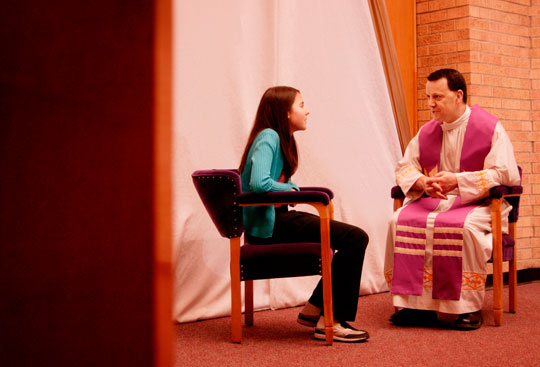
WEEK TWO: Sacraments (Celebrating the Christian Mystery)
DAY 4: We Are All Broken (The Sacraments of Healing)
No doubt you are familiar with Horatio Alger. Horatio Alger, Jr. was a 19th century American author who wrote a number of what came to be known as “rags-to-riches” stories, which embodied what became known as the American Dream—that is, the idea that through hard work, determination, and courage, anyone could lift themselves up out of poverty.
This kind of thinking is at the heart of American culture. Unfortunately, we tend to approach our spiritual lives with the same attitude: “with hard work, perseverance, and determination, we’ll be able to save ourselves!” In reality, the opposite is true. When it comes to our salvation, we are unable to save ourselves. It is only through the grace of God that we are saved—that we are healed from the brokenness of the human condition.
We are all broken and in need of being saved. Frankly, I think that’s the best response to give to someone (especially a child) who asks why they need to go to Mass: “Because you’re broken.”
In addition to the ongoing healing that we receive from regular attendance at Mass and reception of the Eucharist, the Church also provides two other significant opportunities for encountering Jesus’ healing grace: the Sacraments of Penance and Reconciliation and Anointing of the Sick.
Through these sacraments, we encounter God in our brokenness. Our world despises brokenness and, indeed, brokenness is not something to relish. However, our faith teaches us that it is in our brokenness that we are most capable of recognizing the presence of God in our midst. This is why we keep crucifixes in our homes. We look to a symbol of brokenness to represent our salvation. It was through Jesus’ brokenness and his Resurrection that we are saved. When we are broken by sin or by the burden of serious illness, we turn to God in all of our vulnerability for healing. The Sacraments of Healing smooth over the spiritual potholes that prevent us from journeying to the Lord.
The very best way to begin the Year of Faith is for each of us to own up to our brokenness and to seek healing by deepening our faith in Jesus, our Divine Physician.
Reflection Questions: Choose one of the following questions and share your thoughts with your fellow retreatants by adding your comments in the comments box below this post.
- What does it mean to say the Christianity is not about picking ourselves up by our bootstraps when we’ve fallen?
- We find healing through the mercy of Jesus Christ. What is your understanding of the word mercy?
- How would you explain to a non-Catholic the reasons that Catholics confess their sins to a priest?
- When was a time that your emotional/spiritual state affected you physically? How about the other way around: a time when your physical condition affected your emotional/physical state?
- Why is admitting our brokennes the best way to begin the Year of Faith?
Prayer
Lord, Jesus, you are my Divine Physician, the healer of my soul, my body, and my spirit. I pray that I may turn to you in my brokenness, knowing that through your Cross and Resurrection, you have overcome all evil, even death. Heal me of my sinfulness and fill me with your grace. In my times of illness, stretch forth your healing hand and restore me to health. I pray for all those who are sick and suffering. Lord, may they experience your healing compassion. Amen.
Additional Reading
- Something’s Broken
- Re-Situate Your Life
- What Forgiveness Means
- Things We Cannot Change
- On Suffering
- Everything is Changed
CCC References: 1420 – 1532
◊ ◊ ◊ ◊
I hope you’re enjoying our online summer retreat, Preparing for a Year of Faith! Take a few minutes each day at your convenience to “gather” here on my blog as we seek to add some flavor to our faith lives by deepening our understanding of the truths of our faith as given to us in the Catechism of the Catholic Church.
Learn more about the Year of Faith. Watch a brief video explaining what this online retreat is all about.





Admitting I am broken helps me to understand I am in need of God’s healing power – just as if I am physically ill, I would want a doctor’s ministering. There are always times in my life that I need to be healed, life is a journey and sometimes I may take the wrong path – admitting I have a problem and seeking healing and understanding will help me to the right path.
I’m not sure i agree with your statement that we can’t repair our spitual lives with hard work, perserverance and determination. Although God is ultimately the savior for humankind i don’t think he wants me to lay back and do nothing productive in my life with the hope that he will take care of me. I have an obligation to do my best to lead a good life helping others and being the most loving person i can. I think that is critical to my salvation.
Karen, thanks for your thoughts. Absolutely right that we are not supposed to “lay back” and not do anything productive. However, it is the recognition that it is GOD who saves and heals that compels us to work hard to encounter, accept, and embrace that saving grace. Leading a good life and being the most loving person we can be does not save us but rather is done out of response to the fact that we are saved. It is precisely when we recognize that God loves us as he does that we also recognize an obligation to respond appropriately. We work hard at our spiritual lives with perseverance and determination so that we may fully benefit from the grace of God that repairs our brokenness. Admitting our brokenness is not license to throw our hands up and say “oh well” but is rather the first step to realizing what God can do for us if we work hard at following him.
I don’t think I would tell a child, “Because you’re broken.” Maybe we’re thinking of different age groups when we use the word, “child,” but I don’t think children have the capacity to understand that sentence the way that an older person would.
I acknowledge every day that I need help and healing, and ask God for those things, and I think that a child would understand, “Because we all need help to be good, and when we go to Mass, God gives us that help.” I can understand “broken” in many ways, and it is a good word for meditation and prayer of petition, but I think it would be confusing and frightening to a little one.
I am broken, that is why I seek God by continuously go to Mass and doing works of mercy. Admitting that we are broken is acknowledging that we are in need of healing (repair) thus going to confession. Healing my relationship with God and broken self.
I admitted this morning to my husband that I felt broken. We were accumulating weeks of non-communicating and we agreed that we were both struggling with making each other feel important. When I think of what Jesus did for me and the suffering He encountered as He carried the cross to His death, I am humbled by God’s love for me. Since this morning, my husband and I have talked and have committed to each other that our love and marriage vows are worth fighting for. Jesus fought for all of mankind and we were saved by His ultimate sacrifice.
Hi Joe,
Our parish would like to do a “Blessing of the Backpacks” on the Sunday
Before school starts. Do you have a blessing prayer for this event?
Thanks,
Chris
Hi Chris…can’t say that I do however maybe some of our friends out there in cyberspace can help out!!!
We confess our sins to a priest first of all because they have the power to offer absolution. We cannot receive absolution for our sins by having a private conversation with God. Going to confession also gives us the opportunity to have some good advice and someone to make us think about what we’re doing. We cannot counsel ourselves out if we quickly dismiss our sins in private to God. If we bring our sins to a priest, we have to tell another human being that we’re sorry and that we’re willing to change our ways. We often act more appropriately when we’ve made a commitment to someone else. It is a very humbling, yet freeing, experience to go to confession. We need the priest’s expertise in guiding us to change our ways and that cannot happen when it is us along with God. We cannot change if the only person giving us commentary is ourselves. Being able to bring our sins to a priest is not only a very humbling experience, but it also helps us to be able to admit to others when we have done wrong. We know that we make mistakes and we always hope that a sincere admittance of our errors will bring forgiveness. Unfortunately, there is no other forgiveness that can compare to the kind offered in confession.
What does it mean to say the Christianity is not about picking ourselves up by our bootstraps when we’ve fallen?
As Christians, whether we’ve fallen due to despair, illness, or sin; we know that we are never alone during those times. God is there to give us his forgiveness, love, compassion and healing grace. I often ponder about people who are atheists and wonder what they do in those situations. Not to have that presence of God their lives, the relationship and love that God wishes for us all. I pray for them to come to know God.
Whenever I explain why as a catholic I confess my sins to a priest I first explain that the priest is God’s representative on earth. So he is acting on God’s behalf whatever I say to him is in strict confidence and I am saying it out loud, addressing God and openly admitting my faults and weakness . Through his ordination the priest is able to absolve us in the name of God and so cleanse our hearts and remove any barriers which stop us from loving Him as we should. It is such an important healing sacrament and it’s not always easy for us to admit our sins or to feel comfortable telling someone else our faults. We need to remember that God is all seeing and all knowing and he sees what we have I our hearts. Let’s try to keep them clean and ready at all times to recieve Jesus in them.
I receive many questins as to why Catholics need to confess to a priest. I simply tell these individuals that whe you get things off your chest by speaking them out loud not only does God hear them but they get to hear themselves which helps them to better internalize and absorb what they’ve said a really hear what their needs are. By speaking to a priest one must see )as it should be) is that you are sitting beside God and speaking to Him directly by placing this in you mind and heart you will feel the spiritual connection of God being with you and within you and you will find solace and peace. We must see that God lives and is within each and everyone of us, as such you aren’t confessing to a priest but to God himself made flesh.
I believe that admitting I have sinned out loud to a priest is the best thing. Saying it out loud is facing the sin. This helps me better to deal with the sin. I think we can feel as long as we don’t say it it isn’t true.
Once we have confessed it and the priest gives us absolution it is the greatest feeling to know that we are healed.
Jesus has told me He forgives me through the words of the priest.
A reason that Catholics confess their sins to a priest:
Jesus always forgave sins via the sinner having a physical encounter with Him.
We confess our sins to a priest because it helps us begin to heal and not be broken and for us to be forgiven.
Why is admitting our brokennes the best way to begin the Year of Faith?
This is the best way because you have to admit to yourself first that you are broken before you can be healed. You have to know in your heart that you need to be healed.
Why we confess our sins to a priest, and how we explain this to non catholics?
Actually I had a conversation with a Catholic Faith formation teacher just today about this very topic and she even questioned why do we have to confess our sins to a priest. I answered well you know how people bring their brokeness, problems and bad actions that they wish to change to a Psychologist and pay money for it. She replied yes well I said we can bring all our sins and actions we perform that we wish to change to the priest and through God’s graces through the priest and some work from us we can better our selves and receive God’s mercy. I once heard a story about how the work of a priest and a psychologist are very similar but the psychologist said no our work is very different because most people in his or her office say I feel this way because this one did this or that to me, but in a confessional a person takes ownership for their actions. We need more education in this area even for catholics.
God Bless,
Grace